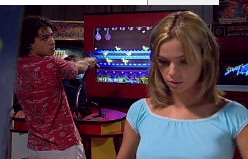HOUVE UMA VEZ DOIS VERÕES (Two summers)
(DV/35 mm, 75 min, color, 2002)
|
Chico, a teenager on vacation at the "longest and worst beach in the world ", meets Roza at a games arcade and falls in love. They make love on the night they first meet, but she vanishes. Along with his friend Juca, Chico looks for Roza on the beach, in vain. Only later, already back in the city and his organic chemistry classes, does he meet her again. Chico wants to talk about “that night”, but Roza tells him that she is pregnant. Before next summer, she will be getting in and out of his life many times. PRESS MATERIAL (just in Portuguese) |
 André Arteche and Ana Maria Mainieri |
Director: Jorge Furtado
Executive Producers: Nora Goulart and Luciana Tomasi
Written by: Jorge Furtado
Cinematographer: Alex Sernambi
Art Director: Fiapo Barth
Music by: Leo Henkin
Production Manager: Ana Luiza Azevedo
Production Coordinators: Marco Baioto and Debora Peters
Editor: Giba Assis Brasil
Assistant Director: Alfredo Barros
A Casa de Cinema PoA Production
Main Cast
Andre Arteche (Chico)
Ana Maria Mainieri (Roza)
Pedro Furtado (Juca)
Julia Barth (Carmem)
Victoria Mazzini (Violeta)
FULL CAST AND CREW
Prizes
- 12th Ceara Film Festival, Fortaleza, 2002:
Best Film (Critic's Choice), Best Direction, Best Screenplay, Best Editing. - 5º Festival do Cinema Brasileiro de Paris (França), 2003:
Best Film (Oficial Juri). - 4° Grande Prêmio Cinema Brasil, 2003:
Best Original Screenplay. - 2° Down Under International Film Festival, Darwin (Australia), 2004:
Best Screenplay.
Reviews
"If you are a teenager or have just come out of adolescence, you will recognize yourself in TWO SUMMERS. (...) This entertaining romantic comedy deals with the sexual initiation of two friends, Chico, the protagonist and narrator of the story, and the pragmatic Juca. While Juca is willing even to pay for sex, Chico goes searching for his first love when Roza disappears the morning after they make love on the beach – as director Furtado said, mentioning Shakespeare’s characters, his script is about a Romeo in love with a Lady Macbeth and whose friend is a Falstaff."
(Ticiano Osorio, ZERO HORA, Porto Alegre, 19/Apr/2002)"The filmmaker has, from his first works, (...) sought to couple emotion with social criticism, entertainment with reflection. (...) In his first feature film, Furtado allows us a glimpse into his future work: a cinema that elects the character as main element, and through it seeks to reflect on our reality. (...) The protagonist, experiencing a moment in his life, is, in reality, becoming a character of an unwritten play, when he begins to act according to the designs of his first passion. That is what distinguishes the film from a superficial comedy. The story is about teenagers who know little about the world, but it also highlights what reality itself, through “playacting” – Furtado’s cleverest find, as he also wrote the screenplay -, gradually teaches the main character."
(Helio Nascimento, JORNAL DO COMERCIO, Porto Alegre, 26/Apr/2002)"The first great find of the film is the almost documentary form that Furtado utilizes to tell the story of Chico, Roza, Juca, Violeta and Carmem. As it is shot with a digital camera, there is total mobility of action, doing away with fake sets in the style of Globo TV soap operas. (...) The characters talk and act the way they really are, like teenagers, trying to administer the activity of their hormones, the need for sex, the search for a relationship more stable than a one night stand. (...) For all those reasons, TWO SUMMERS has a very particular local feel."
(Goida, ABC DOMINGO, Novo Hamburgo/RS, 28/Apr/2002)"Whoever saw it liked it. A lot. TWO SUMMERS (...) grabs conquers grown-ups and teenagers who recognize themselves on the big screen, in the adventures experienced by the teenage trio Chico-Roza-Juca on the beaches of the Northern coast of the state of Rio Grande do Sul. (...) After seeing the movie, we all leave the theater with a feeling of having accomplished something. Furtado and his team, for having made an entertaining and moving film, that brings generations closer together, and us, spectators, adults and teenagers, for having enjoyed a film that moved us and brought us closer together. All of us, city people from the south of Brazil."
(Fernando Mascarello, ZERO HORA, Porto Alegre, 04/May/2002)"What matters is that everything is light, quick and fun, and the dialogues delightful. A humanist look, both ironic and tender, at the teenagers of Porto Alegre and of the whole world. (...) The digital video not only gives agility to the narrative but also an interesting chromatic treatment and texture to the image, that acquires a peculiarly nostalgic atmosphere, as if the film regretted the fugacity of those green years, about to become past. In the same way, the choice of a young cast with little or no experience gives the characters a freshness and vitality that would be hard to achieve with more experienced actors. The sound track is another find: songs that made their mark in the sixties and seventies, rerecorded specially for the film by new artists and bands. (...) Generations pass, but the idea of youth remains intact. This is the feeling communicated by TWO SUMMERS, with talent and tenderness."
(Jose Geraldo Couto, FOLHA DE SAO PAULO, S.Paulo, 13/May/2002)"LOVE SEES FAR: The first feature film of Brazil's most important director of short films is unpretentious but wise. (...) The actors stand out for their truthfulness and the images captured on digital camera contribute to the poetic atmosphere. But the strongest point is the generosity with which he treats his characters. Furtado never slips into a moralistic posture, he never judges young girls of questionable character and he stays well away from the vulgarity of American teen comedies. (...) The director's wisdom is in showing that not only is love not blind, but it sees the essence behind the actions. It sees far enough to detect beauty in persons behaving in ways that common sense would deem reprehensible."
(Cleber Eduardo, Revista EPOCA, 02/Sep/2002)"There is a beauty in this unpretentious film that is perhaps in the background, and it involves the actual nature of the act of love. No one is realistic when in love. When you manage to be objective, it is because the passion is gone. When your loved one disappoints you, what happens is not that you start telling yourself lies. This would be very simplistic. You start to develop an elaborate type of thought process, perhaps delirious, which will consist in attributing hidden reasons and motivations for the acts of your beloved, in such a way that these acts come to be, if not excusable, at least understandable. And thus you will maintain the belief in the predictability of your beloved's acts, and feed the hope in the future. When this mechanism falls apart, that is a sign that the passion has passed, like summers pass."
(Luiz Zanin Oricchio, O ESTADO DE SAO PAULO, 06/Sep/2002)"HOUVE UMA VEZ DOIS VERÕES (TWO SUMMERS) succeeds in portraying teenagers, their doubts and anxieties with irreverence and truthfulness. Furtado builds characters whose merit is their apparent normality. They are young people without any affectation or labels stuck on their foreheads, ordinary people you could meet anytime anywhere. (...) Instead of technological pyrotechnics, Furtado made use of other weapons: a well structured screenplay, with subtle humour, and a classical way of shooting, secure, without any big inventions."
(Guilherme Werneck, FOLHATEEN, Sao Paulo, 16/Sep/2002)"Stop for a moment and think. How many times has Brazilian cinema produced films for the teenage audiences? Perhaps due to this deficiency, the beguiling HOUVE UMA VEZ DOIS VERÕES (TWO SUMMERS) is like an oasis in the desert. (...) With its colloquial language, juicy dialogues and rocked to the underground sound of Wander Wildner, Ultramen and Sombrero Luminoso, among other southern rock bands, the film's only pretension is to amuse the spectator for just over an hour. And it succeeds."
(Miguel Barbieri, VEJA SAO PAULO, 01/Oct/2002)"HOUVE UMA VEZ DOIS VERÕES (TWO SUMMERS) does not suffer from the intellectual anaemia that is so typical of current teen movies, while at the same time it is healthily pop. (...) This rather short film (it is just over one hour and ten minutes) stands out due to its excellent script and the very funny dialogues that keep well away from any clichés. Furtado says the actors collaborated in creating the characters."
(Jefferson Lessa, O GLOBO, Rio de Janeiro, 10/Jan/2003) 19/04/2002
19/04/2002







